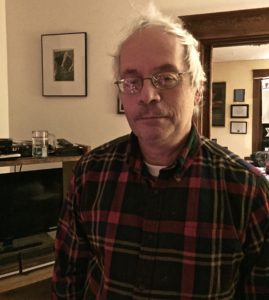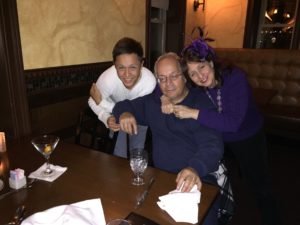This story comes to us from Rio Contrada, a young filmmaker and producer whose father, Fred Contrada, has progressive supranuclear palsy (PSP). Rio is making a short film based on his father; the crowdfunding link to support his project is below.

I was 25 years old when the accident happened. My girlfriend and I had just started to feel settled in our apartment near Venice Beach in Los Angeles. On June 22nd, 2016, my mom called and told me my dad tried to hit the brakes on his new road bike and suffered a severe concussion. My father was a journalist, a fiction writer and a natural storyteller, so it was unnerving how disoriented he was when I called the hospital. He wasn’t himself.
At first, I filed it away as a freak accident from which he would soon recover. But months passed and his memory loss didn’t improve. He started to exhibit compulsive behavior. I saw him a month later at my cousin’s wedding. He left the party about ten times to look for his glasses in the car. They weren’t there. It was becoming clear this was more than a concussion.
Around Christmas of 2016, I started interviewing my father to make sure I had a record of his memories. After the first interview, he tried to cook my favorite meal for dinner – shrimp cacciatore. It wasn’t the same. He had forgotten to peal the shrimp. Later that night, my mom and I were watching TV when we heard a loud thud. My dad had fallen in the shower. We picked him up and dried him off. “Scary, huh?” he said. “But I’m alright.”
In the Spring, I quit my job producing reality TV, sold my car, and drove with my girlfriend back across the country. By that time, my dad’s compulsive behavior had gotten worse. He was incontinent and a major fall risk.
It’s been almost two years since the accident. We’ve seen three neurologists, a neuropsychologist, a urologist, physical therapists, occupational therapists, trainers, primary care physicians – for a while, we seemed to have a doctor’s appointment every day.
My mom and I fought a lot. There were two caretakers now. Only one of us could help him get out of the car.

He had a particularly bad fall, followed by a stay at a subpar rehab facility, where he was mostly bedridden. We brought him home and pushed him up the stairs to his room. We changed his diaper and got him into bed. He was exhausted. I lay next to him and stared at the ceiling, thinking about how when I was a kid, I used to lay in the same spot and he would read me comic books. Now all I could think is that he was dying.
We moved his bed to the first floor, but his instincts were to go upstairs. First, we put a heavy desk in front of the stairs to keep him from climbing them by himself. He managed to push it aside. We built a gate. He climbed over it. Finally, we built a wall with a combo lock. We installed alarms on the doors. This helped, but also forced us to tell him over and over that he couldn’t go upstairs. We had made him a prisoner in his own house.
The incontinence got worse. My mom slept downstairs on the couch, next to his bed. He woke in the middle of the night, nearly every night. My mom would change him, put his sheets in the laundry, and put him back to bed. But it wore on her. Sometimes I would find her asleep in her study, still clutching the book she had been reading. I would tuck her in, grab a blanket for myself and go sleep on the couch. Sometimes my dad would try to get out of bed so many times during the night that I would plead with him, “Please, just another hour of sleep.”
The falls got worse. Sometimes we would turn our back on him for just a second — to get a clean change of clothes, or to put our rubber gloves on — and he would fall. I would bring him to the gym and see all of his bruises when I helped him shower. It felt like it was our fault.
After Christmas of 2017, my mom announced that she couldn’t maneuver him on her own anymore. It was frustrating, because I could still get him around, but he needed to be watched 24/7.
He went into a nursing home. It was something I knew he didn’t want for himself. When he was healthy, he once told me if he ever got to that point, to bring him into the woods and leave him. When we visited our first nursing home, he gave us the classic line: “This is where people go to die.”
We didn’t get to choose which nursing home. He was admitted to the hospital after a nasty fall that left him with yet another bump on his head. He was released into the only nursing home with an open bed. There were sick people wandering free everywhere. One resident was in her nightgown behind the nurse’s station, leafing through their administrative files. There was no nurse at the station. There were aids on their cell phones. My dad had a roommate who wouldn’t stop spewing nonsensical conspiracy theories.
At night, there were 44 residents and 1 aid. They would line everyone up in front of the nurse’s station, often with nothing to do, not even a TV to watch. I would come to visit and see my dad amongst the flock of dementia patients, hunched over in his wheelchair, his nose dripping onto his t-shirt. Was this really the same guy who taught me how to throw a baseball, ride a bike, build a campfire?
We’ve been through a litany of diagnoses. Frontotemporal Dementia. Lewy Body Dementia. Parkinson’s. A few weeks ago, our neurologist at UMASS Medical talked to us about PSP. The new diagnosis seemed to explain why my dad ‘s condition progressed so much quicker than garden variety Parkinson’s.
My dad is in an assisted living facility now. It’s a big step up from the nursing home, but it’s expensive. Our Mass Health application is still in limbo. We’re not sure what the next step will be.

I’ve been working on a short film about his illness since I returned home to care for him. It’s helped me make sense of everything that’s happened, and keep the good memories alive. I think the hardest thing in the whole experience is seeing how quickly you can lose your humanity. Two years ago, my dad laughed with his friends, went on mountain climbing trips, took my mom out to concerts on Saturday nights. Now people talk about him like he’s not there.
The film is my attempt to connect the dad that I still have today with the person he used to be. To this day, he always wants to get up and move. He constantly tries to stand. He tried to escape from the nursing home and used to sneak out of the house.
He was a huge fan of Kerouac. He spent most of his 20s and 30s on the road. He worked on a salmon plant in Alaska, an apple orchard in Oregon, a tugboat on the Mississippi River. My grandma told me that even when he was home for the holidays, he was itching to get back on the road.
I hope that my dad will watch the film and know that I never stopped seeing him as the person he is. I hope that my family will watch it and know that it’s okay to bicker, okay to cry, okay to throw a temper tantrum. I hope that people with degenerative illnesses will see that other people understand what they’re going through, and most of all, that their lives aren’t defined by their illness.
Support Rio’s film at https://www.indiegogo.com/projects/time-to-go-kids#/

